June 10, 2017: #SaturdayScene
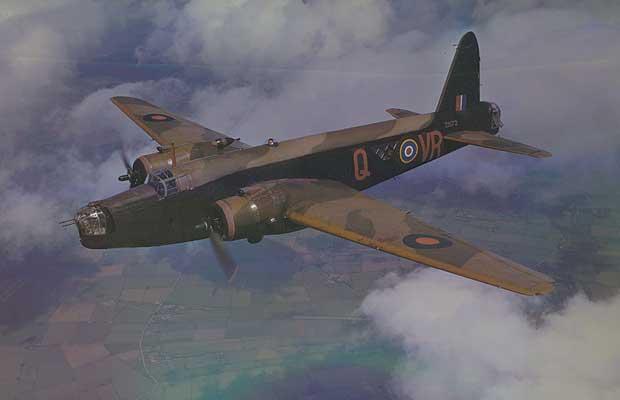 This week’s #SaturdayScene is a sneak peek into my new novel, THE POSTWOMAN, a work in progress based on the life of Andrée de Jongh a member of the Belgian resistance during World War II, to be published before year’s end.
This week’s #SaturdayScene is a sneak peek into my new novel, THE POSTWOMAN, a work in progress based on the life of Andrée de Jongh a member of the Belgian resistance during World War II, to be published before year’s end.
Captain Roy Langlois announced “power on” and pushed the power levers full forward as the roaring, giant twin Rolls Royce Merlins started to bite the air and twenty-eight thousand pounds of Wellington bomber—bombs, fuel and crew—slowly started to lumber down the active runway at RAF Binbrook. Jack was ensconced in his front gunner’s bubble turret with both of the three bladed propellers just five feet from each of his ears. His turret located twelve feet directly in front of the captain’s windscreen afforded Jack a bird’s eye view of the runway as the big plane picked up speed. The rear wheel came up and the plane’s fuselage became horizontal affording Jack an even better view. As the bomber approached rotation speed, the giant four foot tires started to bounce as the captain pulled back on the wheel. The thrill of flight always amazed Jack as anything weighing nearly fourteen tons seemed impossible to lift into the air. With the final bounce the “Wimpy”, as they were called, jumped up and the ride in the late night air instantly became smooth.
Jack watched the ground disappear with the increase in altitude. He tugged one last time on his seat belt apparatus when he felt a mild shudder as the big plane penetrated a layer of low lying scud clouds. His thoughts turned to the mission which was his first official bombing raid. They were to join the other nine Wellingtons, already in the air, that made up the Twelfth Squadron. Their assignment was the large tire manufacturing plants in Aachen located two hundred fifty miles southeast near the German border with Belgium. The flight would be over the Strait of Dover and across Belgium to Aachen where they would drop their ordinance and return home. Once they joined up with the rest of their squadron, the whole mission promised to be over in four to five hours.
Jack knew the front and rear gunner’s position on the Wellington were the most dangerous seats in the plane. The rear gunner was vulnerable when attacked by the German Messerschmidt 109 fighters—who usually attacked from behind—and had four Browning 303’s just for that reason. A single Browning could fire nearly twenty rounds a second. Multiply that by four and an aware rear gunner could throw out an amazing amount of lead in a short period of time. The greatest peril for the front gunner was flak. The German anti-aircraft guns would program their ordinance to explode at the altitude they thought the enemy was flying. The white hot metal from the explosions could penetrate the gunner’s plastic bubble with ease. Normally Jack would sit in the rear gunner’s turret, but for some unknown reason the regular front gunner asked if Jack wanted to change positions. The captain agreed and Jack was happy for a change of scenery.
The captain leveled off at twelve thousand feet along with the rest of the squadron. Jack relaxed as the two big Merlin V-12’s droned on. They were above the scattered layer of clouds and the moonlight reflected off the white silvery cloud tops giving the impression it was early morning and not midnight. Jack thought about Mary, his wife. They’d been married three months. Mary’s parents had wanted them to wait until after the war was over because of the risks Jack would encounter as a bomber crew member. British bombers faced the dual threat of being shot down by the Luftwaffe or the anti-aircraft batteries, which were especially effective as bombers neared big cities. Jack and Mary decided to leave the problem to God. They were were married and spent three nights honeymooning in the Cotswolds. Jack smiled as he remembered Mary’s sweet voice. She loved Jack unabashedly, totally and with no reservations. He reached back into his pocket for a sandwich reveling in his memory.
“Gunner’s, clear your guns,” came the announcement from the captain breaking Jack’s spell, “we’re over the Dutch coast and we need to be one hundred per cent.”
Jack acknowledged his captain while firing short blasts from both guns. “Guns cleared,” Jack reported as did the rear gunner. The harsh rapid recoil of the Browning’s brought Jack suddenly back to the cold hard reality this mission was for real. He had learned to handle the big guns with a light grip because to do otherwise would send the vibrations through his whole body. The captain had told them to keep a sharp eye out for Jerries and the realization that somewhere out there was a fighter pilot who wanted to kill him was sobering. The crew exchanged some light banter between them but their voices had an edge and Jack knew they were all having the same thoughts. The tension hung in the air like the darkness before a huge thunderstorm.
They flew on. Jack’s senses were on hyper-alert. He could see searchlights ahead scanning the night sky for the squadron planes the German air defenses surely heard. If a searchlight beam located and locked onto one of the Wellington’s, the flak guns would all concentrate on that one target and the hapless bomber would know what it felt like to be in front of a firing squad.
Suddenly a shell burst directly in front of Jack. The plane flew through the black smoke with a shutter that threw him so hard he hit his head on the top of his turret even though his seat belt was tight. Jack checked his plastic shroud. No apparent damage.
“That was a close one,” Langlois shouted, “you okay, Jack?”
“Remind me to change my underwear when we get back,” said Jack. He was amazed by the apparent speed of the bomber. Without clouds in the sky, a sense of the forward velocity of the plane was difficult to estimate, however, when they flew through the black flak, their speed of two hundred thirty miles per hour revealed itself in a fast whish.
MAY 6, 2017: #SaturdayScene
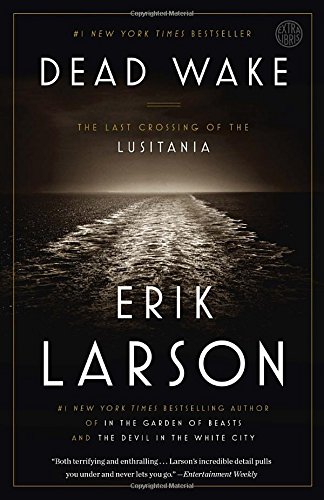
The Lusitania was once the largest ocean liner in the world. On May 7, 1915 she was sunk by a German U-boat sending shockwaves across the globe as 1,201 passengers and crew lost their lives. The ship was traveling from New York to Liverpool when it was torpedoed 11 miles off the southern coast of Ireland. The death of 128 Americans heavily influenced the U.S.’ decision to join the First World War.
Erik Larson’s DEAD WAKE The Last Crossing of the Lusitania offers readers an enthralling and powerful work of historical fiction and is today’s #SaturdayScene.
Captain Turner was standing on A Deck, just outside the entry to his rooms, when he heard the lookouts cry that a torpedo was coming. He saw the track and watched it pass below the starboard rail. There was a brief silence, and then a column of water and wreckage erupted from the sea. The shock of the explosion and the sudden list to starboard threw Turner off balance.
With debris and sea water falling behind him, Turner ran up the stairway to the bridge.
How passengers experienced the blast depended on where they were situated when it happened. The ship was so long—nearly 800 feet—and so elastic that those standing or seated toward the stern, in the second class smoking and dining rooms and the Verandah Cafe, or on the Stern “counter”, where the deck swept out over the writer felt it as a dull thud. Oliver Bernard recalled thinking, “Well, that wasn’t so bad.” Those closest to the bridge felt the impact in a manner more vivid and tactile. “Water, bits of coal, and splinters of wood, etc., coming down on our heads!” recalled Dwight Harris. “I flattened up against the side of the ship, but got soaked!”
Preston Prichard and Grace French were happily searching for her “double” when they heard the explosion and felt the ship lurch to starboard. “The ship listed so much that we all scrambled down the deck and for a moment everything was in confusion,” she recalled. “When I came to myself again, I glanced around but could find no trace of Mr. Prichard. He seemed to have disappeared.”
Too frightened to go to her own cabin, Miss French set off to look for a life jacket on deck, apparently unaware that all jackets were stored in passengers’ rooms.
Out came the watches. William McMillan Adams, nineteen years old and always handy with a timepiece, put the moment of impact at 2:05. “I timed everything,” he said, later. When asked why, he replied, “I just did it; I don’t know why.” Charles Lauriat checked his stem-winding wristwatch and pegged the impact at 9:08 a.m., Boston time, or 2:08 p.m. Greenwich Mean Time. Others put the time at 2:10; this would later become the agreed-upon benchmark.
Within seconds Luriat felt the ship roll to the right and tilt toward the bow. “You could feel the two separate motions very distinctly, ” Lauriat wrote. “It seemed as if she were going down at once, but then she stopped suddenly as if the sea had met the water-tight bulkheads and she seemed to right herself and even raise her bow a little. This gave me a feeling of security , and I at first thought she would stay afloat.”
Moments later a second explosion occurred. (The ever-precise William McMillan Adams timed this at thirty seconds after the first.) Its character was different Where the first had been a single, sharp detonation, this one, Lauriat said, was “very muffled.” A shudder traveled the length of the ship and seemed to rise from deep within the hull, “more like an explosion of a boiler, I should think,” said Lauriat. He was unable to identify the location with any precision. The sound was not “distinct enough,” he said.
In the dining rooms, the plants set out on tables shifted; glassware fell to the floor.
For more, read DEAD WAKE The Last Crossing of the Lusitania by Erik Larson.
APRIL 29, 2017: #SaturdayScene
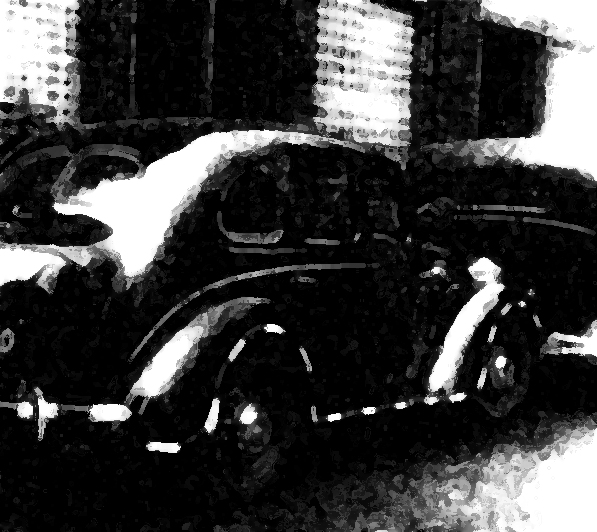 This week’s #SaturdayScene is a special sneak peek into my new novel, currently titled: THE POSTWOMAN, which will be published before year’s end.
This week’s #SaturdayScene is a special sneak peek into my new novel, currently titled: THE POSTWOMAN, which will be published before year’s end.
The street lights were turned off, but Dedee could navigate well in her old neighborhood with just the ambient light from the sky. When she turned onto her street about two blocks from her house, she stopped to scan the area. The street slanted downward and she could easily see that no cars were parked anywhere near her home. In this area, each house had a small yard in back that butted up against the backyard of the house behind it. A small path wove through, separating the backyards. When she came to her block she crossed over and slowly took the path to her house. Happily, she saw a dim light on the second floor which meant that Paul was home. A trellis marked the entrance to the yard. Her father always had to duck under the trellis and she remembered how she never had to. She still didn’t. She stepped up on the rear porch and softly knocked on the door. Hearing nothing, she rapped again this time slightly louder. She heard footsteps coming down the stairs. As she waited, she looked around her old porch. A bicycle was leaning against the house, the same one she had used years ago. Above it hung her old jump rope with the handles dangling in the breeze. She smiled remembering the rhymes she used to sing when she jumped rope.
and rushed inside.
APRIL 22, 2017: #SaturdayScene
 This week’s #SaturdayScene features the opening scene from Man Martin’s upcoming novel, The Lemon Jell-O Syndrome, out this May from Unbridled Books—and a dandy gift for all occasions.
This week’s #SaturdayScene features the opening scene from Man Martin’s upcoming novel, The Lemon Jell-O Syndrome, out this May from Unbridled Books—and a dandy gift for all occasions.
APRIL 15, 2017: #SaturdayScene
 As we wrap up National Library Week, today’s #SaturdayScene is brought to you by former-librarian-turned-author, Jill McCroskey Coupe, and is excerpted from her award-winning debut novel TRUE STORIES AT THE SMOKY VIEW.
As we wrap up National Library Week, today’s #SaturdayScene is brought to you by former-librarian-turned-author, Jill McCroskey Coupe, and is excerpted from her award-winning debut novel TRUE STORIES AT THE SMOKY VIEW.
Newly mulched flowerbeds bordered the curved sidewalk at the funeral home’s entrance. Yellow jonquils, their star-shaped saucers holding tiny cups, seemed to glow beneath a dark and threatening sky. Vrai paused under the portico to button her black wool coat, bought years ago on sale and now snug through the chest. Winter, like the day of Skip’s funeral, was not yet over.
The BMW, she was relieved to see, was gone. But there on the curb beside the empty parking space sat a young boy with black hair.
She hurried down the sidewalk. “Where are your parents?” she asked in alarm, then corrected herself. “Where are Lloyd and Marianne?”
“Dunno,” Jonathan said with a shrug.
“You mean they drove off without you?”
He nodded. “You been crying? I didn’t cry. I think she wanted me to, but oh well.”
“I knew Skip.” That her tears weren’t entirely for Skip would remain her secret.
In a large family a child could be left behind inadvertently, but this had to be deliberate. She sat down beside him. “They’re coming back for you, right?”
Jonathan’s black eyes sparkled. Laramie’s eyes, drawing her in. “I didn’t want to come to the stupid funeral. I had a soccer game today.” He’d exchanged his sport for a thin blue windbreaker that fit him, but he wasn’t wearing any shoes. “I called her a bitch.”
“Marianne? Just now? That’s why they left?”
“Happens all the time. Them leaving, I mean.”
Read more about Jill and TRUE STORES OF THE SMOKEY VIEW here.
APRIL 6, 2017: SaturdayScene
On Sunday, April 6, 1862, the Confederates stormed out of the woods and attacked the Federal camps around Shiloh Church, surprising Grant and his nearly 40,000 men. The men soon rallied, though, and bitter fighting consumed “Shiloh Hill.” Throughout the morning, the Confederate slowly gained ground, forcing Grant’s troops to give way.
Despite having the momentary upper-hand, Johnston’s troops soon became as disorganized as the Federals. Then, at mid-afternoon, as he supervised an assault, Johnston was struck in the right leg by a stray bullet and bled to death, leaving Gen. P.G.T. Beauregard in command of the Confederate army.
Overnight, reinforcements arrived for Grant—unbeknownst to the Beauregard—and at dawn, April 7, Grant attacked. Throughout the day, Union armies, numbering over 54,500 men, hammered Beauregard’s depleted ranks and the exhausted Confederates could no longer hold them off. Forced back to Shiloh Church, Beauregard skillfully withdrew his outnumbered command. The Battle of Shiloh, or Pittsburg Landing, was over. It had cost both sides a combined total of 23,746 men killed, wounded, or missing,
Excerpted from HOME AGAIN: A Civil War Novel. Three scenes for Saturday, in which we see the Battle of Shiloh, one of the most important battles in the Civil War’s western theater, from the perspectives of Luke and Zach . . . .
Back at the 28th’s bivouac area, the men were all gathered, nervously awaiting some word from command on what was going to happen. Rumors were rampant. Many predicted that the anticipated arrival of Grant’s Army of the Tennessee, thought to be one hundred thousand strong, would mean Johnston would be forced to retreat further to the south. Johnston had been retreating for weeks, giving up Kentucky and most of Tennessee, and very few thought he would make a stand here. In addition, they heard General Carlos Buell and his Army of the Ohio was near Savannah, just across the river from Pittsburg Landing, which was even more reason for Johnston to retreat.
After several hours of waiting, word finally came. Colonel Murray rode his horse into the middle of the crowd and everybody quieted down, intently interested in what the orders were going to be.
“Men! We have been called upon by our country and God to preserve our rights as a free nation. To protect our homeland from this immoral deprivation of our liberty. To reject this invasion of scoundrels who would impose their way of life on us. To protect our women from the rape and pillage of those huns from the North. To seize the day and push these dastardly encroachers back into the Tennessee River and then drown them in their own blood!”
The men started to cheer, getting louder and louder. They were tired of running away, and in their colonel’s voice they could hear redemption as an army. They knew that their march the next morning would be toward the Union camps about twenty miles northeast in the direction of Pittsburg Landing. After several minutes of raucous cheering, the colonel unsheathed his sword and held it high. “Tomorrow, before first light, we move. Not in retreat to the south, but north to meet the enemy on the field of battle. We will have a glorious victory.” With the last words, as if on cue, came a bolt of lightning. Another crack of thunder gave the whole scene an almost divine aspect that inspired all who saw it.
Luke was spellbound. The colonel’s logic and condemnation of the Northern invasion made perfect sense to him. He wanted to do whatever was asked of him, to do his part to make victory possible. The rain started, and as night approached, the men were issued rations for three days and as much ammunition as they could carry. They tried to build campfires, but the wood they found was too wet. Most did not have anything waterproof and just lay down and tried to get some rest before they had to march again in the morning.
The rains had just let up when the bugle called reveille, raising the men out of a restless, wet night. In spite of the conditions, spirits were high as the men formed into columns. They would begin a fifteen- to twenty-mile hike to meet the enemy. The marching soldiers quickly churned the rain-soaked roads into muddy quagmires, slowing progress down to a crawl. Small streams had turned to rivers, each taking extra time to cross.
They were two days late in reaching the area from which they were to launch the attack, having taken three days to travel what should have been accomplished in one. Rumors were that General Buell had already crossed the Tennessee at Pittsburg Landing, and that they were severely outnumbered. Most thought they would just retreat again.
On the early evening of April 5th, Confederate Generals Polk, Braxton Bragg and Beauregard held an informal meeting less than two miles from Shiloh Church and the Union camps. Beauregard had developed a plan that would sweep to the right along the Tennessee River, forcing Union troops away from Pittsburg Landing and thus denying them the ability to use the river for reinforcements, supply and escape. The intention was to drive them into the swamps to the north. The delay, however, made them change their minds. Beauregard thought the delay had cost them the element of surprise, and he knew General Buell was near Savannah with an additional thirty thousand troops to boost Sherman’s forces, which would give them numerical superiority. Polk and Bragg agreed the attack should be canceled. Then General Johnston rode up and joined the discussion in what was later to be called the “council of war.” Johnston listened to Beauregard’s arguments for calling off the offensive, however, he overruled and said they would attack at daylight. “I would fight them if they were one million,” he famously said.
Beauregard, after agreeing not to delay, put one hand on his scabbarded sword and with his other hand pointed to the distant Federal camps. “Gentlemen, we sleep in the enemy’s camp tomorrow night,” he said.
Beauregard’s battle plan was approved by Johnston and issued to all the commanders. Three corps under Generals William J. Hardee, Polk and Bragg would fan out to form a broad front pushing north. Breckinridge’s corps was initially held in reserve but was quickly deployed to the right of Bragg….
Luke wasn’t sure of the date, but he thought it was April 6th. The one thing he was sure of was it was very early in the morning and he had not slept a wink all night. Already, sporadic gunfire could be heard well to their front, which added an eerie uncertainty to what the day would offer. Luke’s job that morning would be to follow his regiment in a wagon pulled by a team of horses to supply ammunition, water and medical needs.
The widely sporadic musket fire rapidly turned into sweeping waves of intense staccato rifle discharges. The early morning light made the battle more visible, and Luke’s brigade started moving forward, ready to fill in as needed. The Confederate surprise attack appeared to be working as the Federal lines sagged and fell back. Soon, wounded soldiers who could still walk started streaming back through the reserve ranks. The first wounded soldier Luke saw had his right hand shot off. His bones were exposed and his clothes were blood-soaked. The man just held up his arm, looking at his missing hand with terror on his face, incredulous. One instant his hand was there, and the next it was gone. He fainted. Some other soldiers tried to assist him, but they were strongly rebuked, told in no uncertain terms to stay in line, no matter what.
Luke had his orders, but this was a fellow soldier. He looked over at Hayes, who was also looking at the fallen man. In an instant, he jumped off the wagon, ran to the wounded man, tore and section of his shirt off, wrapped it around the man’s arm just above the wound and pulled it as tight as he possibly could. He then tied it off and ran back to the wagon. The whole thing did not take two minutes.
As Hayes watched him, he was reminded of his idea to transfer Luke to the Medical Corps. He would try to get that done the next day. The way it was going, however, the battle might be over by then.
The 28th kept moving forward behind the advancing lines of the first three corps. With little wind, the smoke from the musket fire shrouded the field. At times the opposing lines of battle could not be differentiated. Then the order came to move up. Colonel Winfield Statham’s troops, which included the 15th and 22nd Mississippi and the 19th, 20th and 45th Tennessee, in addition to the 28th, were ordered to fan to the Confederate right. Alongside Statham was the brigade of John Bowen, who had just been promoted to brigadier general six weeks prior. Bowen’s brigade consisted of the 9th and 10th Arkansas, the 1st Missouri and the 2nd CSA.
The two brigades marched abreast, heading forward and to the right. They crossed several low areas and by about eleven reached a higher elevation that looked over on a cleared field. As different units moved forward and engaged, the fighting was intense, with musket fire reaching a crescendo, diminishing, then rising again. Engagements did not happen simultaneously across the field of battle, and the sound gave the impression to Luke of waves rippling across water. When the action in front of him would die down, he would take boxes of ammunition to the rear of the front lines so each soldier could access what he needed. Being the only ammunition wagon for the whole brigade made him very busy, and the time flew by.
As the brigades moved forward, the severely wounded and dead would be left in the field, and Luke would have to carefully weave his wagon between the bodies to avoid running over them. Men would be moaning or yelling for water. He wanted to help each one, and to ride by without being able to help made him feel cold-blooded and most of all, guilty – guilty that he felt obliged to obey orders rather than help relieve the men’s suffering.
Around noon, Luke was out of ammunition and water. He saw Hayes a distance away and rode over to him to ask where he should go. Hayes said he wasn’t sure where the supplies had been moved up, but he should proceed to the rear until he found them. Traveling back through the areas that had been contested earlier in the day, Luke saw more wounded, dead bodies, dead horses.
After replenishing the supplies, he quickly returned to his regiment’s lines. By the time he got back, Statham’s brigade had advanced another three or four hundred yards to the open field just across a road that extended to the northwest. The Union forces could be seen on the opposite side of the field, with lines of cannon lined up, firing directly into the Southern lines. The Confederate’s advance appeared to be bogged down. Casualties were heavy. Just then, Luke saw a tall officer on what appeared to be a thoroughbred bay horse ride in among his own 28th Tennessee. The men were facing north toward the enemy and the officer, who appeared to be a general, rode out in front, exposing himself to the Union line. He rode all along the line, holding a tin cup and tapping each soldier’s extended bayonet. The men cheered their commander and started moving forward. The general rode behind the line and proceeded toward General Bowen’s brigade, where he raised his tin cup again. Bowen’s Arkansas men also began to advance.
The general was risking his life to rally his men, and it seemed to be working. Slowly, the whole line moved forward as the spent Union forces begrudgingly retreated under withering fire. Luke rode forward with his wagon, going across the road and to the edge of the open field. Off to his right, he saw the general again, still mounted on the large bay. The general seemed to falter as another soldier helped him off his horse. Luke got off the wagon and ran to the wounded general. Others were gathered around, so he could not get as close as he would have liked. Reading the expressions on their faces, however, he gathered that the general’s condition was not good.
“Who is that officer?” he asked one of the soldiers.
“General Albert Sidney Johnston,” was the soldier’s terse reply as tears welled up in his eyes….
The Battle of Shiloh rages on, as considered from Zach’s point of view:
The gunfire off to Zach’s northeast was so intense the Confederates called it the “hornets nest” because the flurry of Minie balls reminded them of swarming stinging bees. Directly under his tree, the movement of Confederates slowed to a halt as the enemy soldiers went around the campsite instead of through it. Zach was in an ideal spot and he began to form a rough plan. First, he had to get to the other side of the tree. For the first time in the past six hours he moved his muscles. His rear was numb and his feet had gone to sleep. As he tried to shift his position, several of the cedar boughs dropped down to the ground. He froze, but nobody noticed, so he continued.
Sensation in his legs returned but his line of vision to the north was even worse than it had been to the south. His only clear view was to the northwest onto an area that appeared to be an old cotton field. Union cannon were lined up on the southern and western edges, and they were firing so rapidly, Zach could not figure out how they could see through all the smoke.
Over the next hour or so, Zach could not pick out any targets. The batteries were firing with increased urgency, but the attacking Confederates were hidden from his view. He scoped the area over and over again, waiting. Finally, the cannon were moved back across the field, and the Union troops appeared to be retreating slowly to the north. With a sinking feeling, he realized unless something big happened, the Rebels would drive Grant into the Tennessee River.
As Zach looked out over the carnage, he felt detached from the battle, not a part of it, like a visitor to a prizefight sitting safely behind the ropes. To the near side of the field were several farm buildings, and gradually he could see a double line of butternut infantry emerge, hundreds of men advancing slowly and firing steadily. As Zach scanned through his scope, he saw a rider on a horse. The horse was a big bay and the rider was wearing a big wide-brimmed hat. He was the general Zach had seen earlier with the tin cup. As he watched, the officer on the horse took the cup and touched his soldiers’ bayonets as he rode in front of them. The officer rode the whole length of the line, then returned to the front center. A flag bearer came up and posted next to him. The officer turned around toward the line of battle and was leading forward with the foot soldiers in close.
Zach realized the general was an ideal target. As the second line came up, the mounted rider fell back behind the line, staying close. The battle intensified, with both the Union and Confederate lines breaking and filling. At one point, the Confederate line developed a hole and the general was immediately there, directing his men to fill it. The Northern line started to waver.
Zach sighted through the scope at the general. Even though it was nearly five hundred yards, he could see him urging his men forward, raising the cup in the air. The wind was blowing toward the target from Zach’s position. His scope was sighted for seven hundred to eight hundred yards, so he estimated he would have to aim slightly low. The target was moving up and back and side to side. Zach patiently waited for him to stop briefly while he was facing away, so he would offer a larger target. Back and forth he moved. Back and forth, pointing here, then there.
Zach was disappointed, thinking he must have missed his target. The wisp of breeze may have moved his tree just enough to cause the bullet to miss wide. Possibly the wind was blowing more than he’d felt. In previous long-distance shooting, he had at times experienced a phenomenon where a tailing wind would make the trajectory flatter and cause the bullet to strike too low. Whatever the case, it appeared he had lost his chance as the general rode back into the woods.
Zach could see the officer’s mouth move as he yelled encouragement to his men. They were evidently inspired by his leadership, because they were moving forward. The general finally stopped and Zach squeezed off a shot, but the general moved again well before the bullet got there. Back and forth. Then he stopped again, facing away toward the battered Union lines, and Zach put the spider lines on the general’s hat, rubbed the stock with his trigger finger, took a deep breath, let it half out and squeezed the trigger again. As he shot, he felt a light breeze on the side of his face. The target did not move; he sat in his saddle for a few seconds, seemingly looking off in the distance. Then he rode away and out of Zach’s field of vision.
As the afternoon progressed, Zach could hear the thunderous roar of cannon. He sighted over near the area where he had taken the previous shots, but his vision was blocked by thick clouds of smoke from the fusillades. The roar of the cannon was deafening, even though he was far away. Dozens of cannon were firing at the Yankee lines all at one time. The Northern line was collapsing where it had previously held. Zach had that eerie feeling of detachment again as he watched what seemed to be a rout of the whole left side of Grant’s line.
Finally, in the late afternoon, the Rebel advance slowed to a stop. The Federals were out of sight to the north and Rebel stragglers started filtering back into the camp below. It was apparent the Rebels had scored a major victory because the men were upbeat even though they were clearly dog-tired. Zach recognized a few of the men from the morning, though this time they were not looting. Rather, they seemed to be settling in for the night using the Yankee campsite. Bad news for Zach. His body felt numb, as if it didn’t belong to him. He was thirsty, hungry, frustrated, and needed to relieve himself.
As time went on, the camp continued to fill with exhausted soldiers. An officer who appeared to be a colonel rode into camp. As he sat astride his large black horse, he said, “Boys, we have done it. The whole Yankee army has been driven back to the Tennessee River, and all the fight has been taken out of them. They have not been reinforced as they expected, and we hold the high ground. We will make camp here tonight, and tomorrow we will finish the mopping up and chase Grant back into Kentucky. What we have done here today is the biggest victory of this godforsaken war and should mean a quick ending so we can all go home to our families and friends.”
The cheering men milled around the colonel, exchanging news from the battle. They learned that Union General B. M. Prentiss had been captured and Colonel Everett Peabody killed, and the exhausted men cheered. The colonel told everybody to rest up and be ready to attack again at daybreak. He promised the ammunition wagons would be coming to resupply everybody’s needs. As he prepared to leave the camp, a rider approached the colonel. He appeared sober and grave as he handed him a message. The colonel read the message and for a while sat on his horse, not moving, hesitating.
Finally, he sat up straight in his saddle and said, “Men, all has not been perfect this day. I regret to inform you that our commander, General Johnston, was shot and subsequently bled to death. May God rest his soul.” The men were silent. “We are now under the generalship of General P.G.T. Beauregard and our orders stand. General Beauregard is confident the Yankees are whipped and we will finish pushing them across the river tomorrow.” He rode off.
APRIL 1, 2017: #SaturdayScene
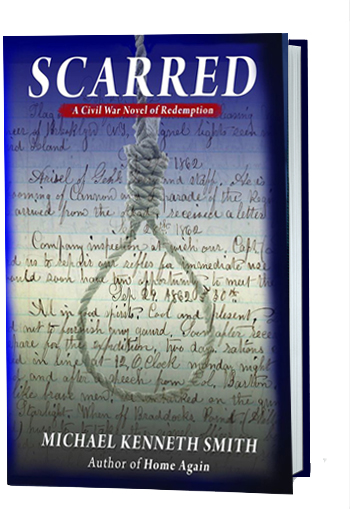 The following #SaturdayScene is excerpted from SCARRED: A Civil War Novel of Redemption.
The following #SaturdayScene is excerpted from SCARRED: A Civil War Novel of Redemption.
Richmond, Virginia, 1864: After having been captured, shot, noosed, and nearly hung, Zach arrives at the notorious Libby Prison.
The sign over the entrance read: “THOMAS LIBBY & SON— SHIP CHANDLERS AND GROCERS.”
This was the notorious Libby Prison.
Zach and sixteen other prisoners entered the prison office, where several clerks recorded names, ranks, and regiments into their logbooks. The prisoners could hear each other being questioned, and when Zach said he had been with the U.S. Sharpshooters, many took notice. The recording clerk asked him how to spell “sharpshooter.”
They had seemingly never processed one before.
The prisoners were then lined up to be searched for weapons, items that could be used as weapons, and valuables.
The other sixteen prisoners were from the Third Union Corps, captured at the Battle of Mine Run. Serving under Brigadier General William H. Morris, they had been largely untested going into the battle. These prisoners were all from New York, and while the Third Corps was mostly responsible for the Union loss, they all appeared cocky, staying apart from the others. They ignored Zach and talked among themselves in a broken English that Zach had trouble understanding. The man doing the searching was referred to as Majah Turnah. He was short, fat, wore a thin goatee, and his tallow-colored skin was covered with sweat. His beady eyes shifted from one thing to another, as if he was worried he would miss something. As each prisoner stood in front of him, he asked for valuables, and peered into their eyes, as if to determine if he was being lied to. Almost all the New Yorkers denied having anything, but he thoroughly searched each of them. He searched under armpits, between legs, and even ran his fingers through their hair. He was not gentle and did not care where he put his hands. He searched everywhere. Whatever he found that might be of value, he slid into his pocket.
Zach was last in line and when the major finally got to him, Zach told him he had nothing valuable. Turner looked up at him and hesitated. Zach held his gaze, and after several moments, Turner nodded his head, motioning him to move on. As he did, Turner’s hand brushed Zach’s rear pocket. “Wait a minute. Stop right here. What this?” He reached into Zach’s pocket and pulled out the dead man’s logbook. He seemed disappointed.
“That’s personal,” Zach said.
“Personal? Personal?” Turner stood. “Look, mister, when you come through that door right there, you become mine. You are all mine. You don’t have any ‘personal.’ You belong to me and don’t you ever forget it.” The major’s fat fingers pointed menacingly at Zach. Sweat dripped off the man’s fat face, soaking his collar.
The boys from New York snickered.
Turner leafed through the little logbook. “Is this yours?” he asked, reading a couple of entries. Then he came to the photo of the woman. “Is this your wife? Your sweetheart?” He read on, his voice becoming louder. “Are you a deserter, a Confederate? Speak up, soldier. What the hell is this all about?”
The room went quiet. Even the clerks stopped and stared.
Zach wasn’t sure where the questioning was going, so he decided to tell the truth. “I was discharged from duty. That logbook belongs to a dead soldier I saw on the battlefield. I just wanted to return it to his family. That’s all.”
The major ran his finger across his forehead and shook the sweat off on the side. His face was turning red as the inside of a watermelon. “Let me get this straight. You say you were discharged, but now you want to go to a dead man’s house? To do what? Tell the family the man is dead? And you are willing to risk being captured to do it? Are you crazy?” . . .
March 25, 2017: #SaturdayScene
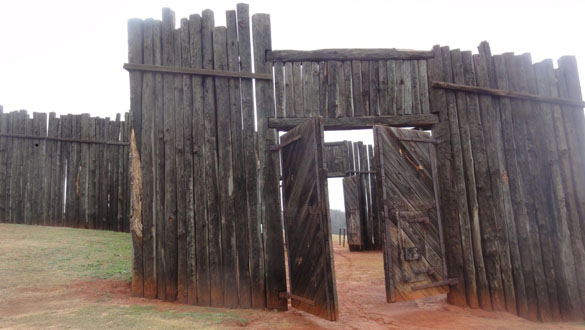 The following scene is excerpted from SCARRED: A Civil War Novel of Redemption.
The following scene is excerpted from SCARRED: A Civil War Novel of Redemption.
Day 35: Andersonville Prison: While repairing the rifle of the prison’s Captain Wirz, Zach formulates—and executes—his plan of escape.
Zach heard the guards shouting orders to the prisoners, and knew it was time. He gave the guard one last glimpse of him, then scurried through the back flap, and ran hard toward the train. He stayed off the trail that led from the depot to the camp, dodging the thin pines. The ground was spongy with rain-soaked pine needles, but he was able to make good time. He heard the guards shouting, much closer, to his left as he neared the train. He stopped and crouched by a large tree to catch his breath. He was surprised how his lack of good food and inactivity had changed him. Only a few months before, this little run would have been much easier. Very little light penetrated the woods, and Zach had to rely on sound as he crept toward the train.
The voices got louder, and Zach could hear the sloshing of the prisoner’s feet on their trek to the camp. Then they came into view. Tightly packed, lined up two by two. They had their heads down as if careful not to step on the heels of the soldier in front. On they came, like a serpent snaking through the trees, with guards every hundred feet or so. Must be a thousand of them, Zach thought. Considering the way they had packed the prisoners in when he had made the journey, he estimated the train must have at least ten cars. That was good.
Zach moved to within sight of the train. The first and last car were covered. All the rest were open flat cars. The train was headed south, as usual. Two men were in the cab of the engine, one throwing wood into the boiler to build up steam while the other man watched for a signal from the guards.
Finally, a shout, then a wave by the engineer as he pushed forward the throttle lever and the train started to inch forward. The engine was old and worn, and the rail cars looked ready to fall apart. Boards were missing, and the wheels squealed as if pleading for a drop of oil. Zach could not be sure the covered rail cars were empty. He decided he would have to ride a flatcar, weather the rain, and risk being seen. On the other hand, he would be able to escape the train quickly if he had to.
The last car rattled by, and Zach moved. He burst out of the trees alongside the train, passed the rear boxcar, and leapt onto the last flatbed. A shot rang out, and a man shouting “Stop! Stop, Runaway!” Another shot and more shouting. Zach froze, lying flat on the floor of the car. He felt the wet boards through his clothing as he tried to make himself disappear.
The train didn’t stop. It continued picking up speed. The engineer probably couldn’t hear the shots through the roar of the rain.
The damp wood feeding the engine decreased the train’s speed. Zach was afraid they weren’t going as fast as a good horse could run. Bloodhounds could certainly run as fast. The train wasn’t his ticket to freedom. He would have to jump sometime soon. The more distance between him and the prison the better, he reasoned. He would wait for the best opportunity, but he had no idea what that would be. The rain beat down on his head. He thought about the night he left home, his warm, soft bed. He even thought about the dry tent he had just left. A cold shiver went through his body as he thought about what Wirz would do if he was captured. Surely, Wirz would be embarrassed that a prisoner had escaped from right under his nose. He would have to make an example of him. That probably meant a rope. Zach realized that his shivers were not caused by wet and cold. He was scared.
A bolt of lightning lit up the dark sky as the train crossed a swollen stream, lapping at the bottom of the railroad bridge. A couple more hours of this rain and the bridge will be gone, he thought. The car jolted to the left and right and up and down, moving with the uneven rails.
He looked back and saw movement. Then he heard the whoop of a bloodhound. The hound was running alongside of the boxcar, directly toward Zach, closing quickly. Zach crouched, ready to leap. Then the brakes screamed as the train came to an unexpected stop, throwing Zach forward. The hound was just below him, howling like he’d treed a ‘coon. Zach ran forward, jumping from flatbed to flatbed with the hound snarling just a few feet below. Through the rain, Zach saw the train had stopped because of a washed out bridge. Reaching the first boxcar, he crossed to the other side, jumped off, and ran toward the front of the train. The hound ran under the car and overtook Zach, its jaws clamping hard on his leg.
Zach saw the swollen stream just ahead. He grabbed the hound, but could not loosen its grip. The dog’s legs were held out straight in front of him, as if he were the rope in a tug of war. Just a few more feet, and Zach could jump. He reached down, clutched the animal by its scruff, and picked it up. The hound still hung on, but Zach was able to move the last few steps and jump off the bridge embankment into the churning black water. Airborne, he felt the dog release its grip.
MARCH 4, 2017: #SaturdayScene
Today’s #SaturdayScene is excerpted from HOME AGAIN A Civil War Novel.
Zach finds himself up a tree, trapped in the middle of enemy territory, having just taken a shot at General Johnston during the Battle of Shiloh, April 1862.
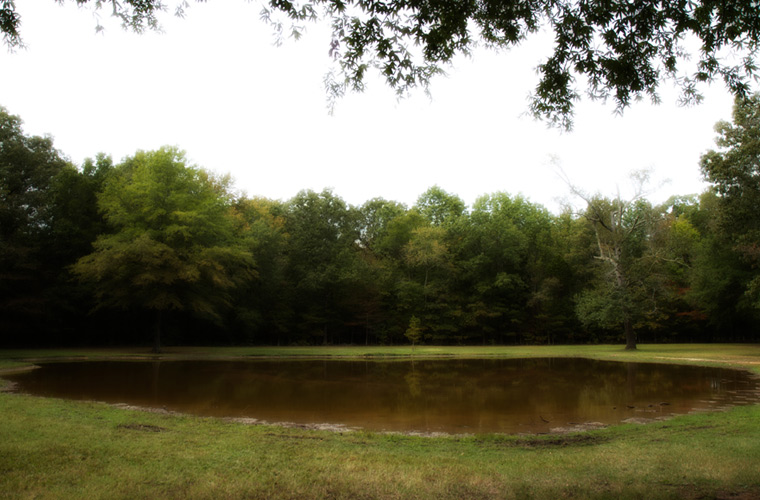
The Bloody Pond at Shiloh (Photo Credit: Civil War Trust)
The rush of adrenaline Zach had experienced started to wear off. The temperature dropped down well below fifty degrees and he had no way of warming himself. He was open to the elements, no rain gear, no blanket and no shelter. He started to shiver. His chin began to quiver uncontrollably and his entire body shook. He moved his hands and feet back and forth to try to keep his blood circulating. He took deep breaths, trying to calm his shaking with no success.
He weighed his options. He did not feel he could stay in the tree until daylight, which might still be four or five hours away. By then, who knows, he might find he would not be able to hang on.
He had to do something.
He took his rope and tightly tied one end around his waist. His fingers were so cold, tying the knot tightly took time. Then he put the rest of the rope over the limb he was straddling, reached under the limb and grabbed the rope from the other side, slid off his perch and slowly, hand over hand, let himself down using the wet limb as a pulley. He threaded his way between the limbs. Any noise he made was masked by the rain, thunder and cannon fire. When he reached the ground, he paused for a moment, not knowing whether his legs would support him. Slowly the feeling came back, and he pulled the rope down and coiled it up. He put the rope on the ground and stepped on it, forcing it into the mud, then he scattered some old twigs and leaves to cover it completely. Next he picked up his rifle, noting it had dropped muzzle first, because the barrel was filled with mud. Damage seemed minimal, but he would have to check it all out in the daylight, if it ever came. He laid the rifle on the ground and covered it with the very boughs he had used for camouflage.
He thought about what he would do. He had no idea how far he would have to go to reach the Northern lines. If the reports he heard from the camp earlier were accurate, the lines could be all the way across the Tennessee River. He did not know how far that was, but he knew the Confederates would have a lot of pickets out and if he was sighted, he would certainly be shot. Even if he did make it through the Rebel pickets, he would probably be shot by the Yankee pickets.
With his heart pounding he walked over to the nearest tent. He opened the flap and in a shivering voice said, “Boys, I just got off picket duty. I’m cold and wet. Could I spend the rest of this godforsaken night with you?”
One of the soldiers looked over at Zach, saw a miserable looking young man and murmured, “Only if your teeth stop chattering; you’ll wake the whole Yankee army.” The soldier rolled over, and Zach lay down in a corner. There were four others in the tent. He tried to stop shivering.
Sleep never came. As he lay there, Zach tried to figure out a plan for the morning, but nothing came to mind. He thought of home and how his life had changed in the four weeks since he’d left. He wondered what would happen in the morning. He thought that if he ever saw his mom and dad again, he would tell them of this day. He was sure nobody would ever come close to believing him.
The lightning storm moved off, leaving the tent in total darkness. However, the cannon fire continued. Gradually, light started to filter in from the east, and the camp started to stir. The men in Zach’s tent awoke, and two of them walked outside. Everybody seemed irritable from lack of sleep, spewing profanities about the wet wood and their inability to start a fire. They had little to cook, but a fire would have been nice to warm up and dry out. Zach just lay in the tent with his face buried under part of the bedroll of the soldier next to him. He could hear the sound of regular cannon with increasing intensity. It came from the north. Then he heard the musket fire, creating a din that sounded like the ripping of a piece of heavy cloth.
Just then a rider came into camp at a very fast gallop. “Buell is here, he and his whole army are coming fast. Run! Run for your lives!” He rode off again, heading south. Behind him, some other Southern troops came running through. They had no rifles and were running like scared jackrabbits. “Get out of here, boys. They must have one hundred thousand men out there coming this way. Run or get slaughtered.”
Some of the men in the camp grabbed their muskets before they ran, others did not bother. Within several minutes, Zach was the only man there. He smiled to himself as he sat in the tent, wondering what really was happening. Thinking he was out of immediate danger, he got up and walked over to where his rifle was hidden. With one of the blankets, he started to clean his rifle, waiting for the Union troops to show up.
FEBRUARY 25, 2017: #SaturdayScene
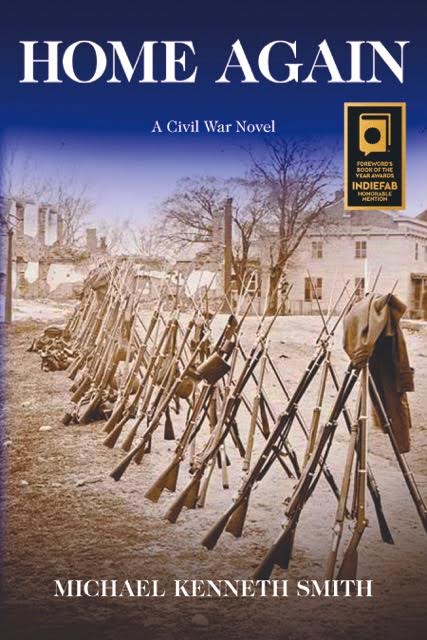 Today’s #SaturdayScene is excerpted from HOME AGAIN A Civil War Novel.
Today’s #SaturdayScene is excerpted from HOME AGAIN A Civil War Novel.
A Confederate sniper has taken down a member of Zach’s company—and Zach has plans for retribution.
The lieutenant looked at Zach, got a wry smile on his face and said, “You’ve sure got balls, kid. Your plan probably has less than a fifty-fifty chance of success, but we have to try to do something, and your idea seems to be the only one we’ve got.”
The two of them spent the rest of the afternoon working out details. One of Zach’s concerns was with the cloudy weather – he would not have enough light to see where he was in relation to the camp when he landed on the other side. They agreed they would start a large fire for him to guide by.
Just after dark, with his rifle and knapsack containing his clothes resting atop of a six-foot log, Zach eased into the dark river. He felt the mud ooze up between his toes. But he wasn’t ready for the temperature; the cold shocked him, taking his breath away. Instantly he knew this job was not going to be as easy as he’d thought. He hesitated. He could hear the rest of his company mocking him if he turned back now. He pushed off, keeping the log in front of him and used a strong kick to propel him toward the opposite bank. The moon was obscured by thick clouds, giving him no clue of his direction or his progress. He kept kicking as hard and fast as possible. The river was about one hundred yards wide, but he knew he was being swept down current at a rapid rate.
He could feel the cold penetrating his legs. His kick was losing power as his muscles contracted from the numbing cold. On he kicked, trying to work across the current. It occurred to him vaguely that it was so dark he really didn’t know if he was swimming across the river or downstream. He thought about how stupid the whole idea was. He had not thought about making a reference so he knew what direction to go. Building a little fire on the bank before he started would have been so easy. He stopped kicking briefly and let his legs go down vertically in the water to see if he could touch bottom. No bottom. His hands slipped off the log and it immediately disappeared into the darkness – the log with his custom-made rifle and warm clothes. He swam toward where he thought the log might be. With each overhead stroke, he felt for the log. No log. In near panic, he propelled himself forward with all the strength he could muster. Thinking he was off target, he turned slightly in the water. His stroke was losing power and he slowed. Something bumped him from the side. It was his log. In his panic, he had swum past it. He grabbed onto it, trying to catch his breath.
With hardly any energy left, he thought he should turn around and go back. But what direction would he go? He felt like he was lost in the middle of a dark ocean. He kept on kicking in the direction he thought he should, but he knew his kick had little power. The cold wouldn’t let him relax. He felt his body heat dissipating into the river. The river, normally a friendly place, benign, serene, now was an unsuspected adversary trying to steal the last bit of his reserve energy, trying to pull him down into the depth.
He kicked in a panicky rhythm. He just kept kicking.
His foot hit something. It was an underwater piece of brush that had lodged itself in the mucky bottom. He swung free of the brush, then felt something again. He let his legs sink down and his feet gained traction. Zach was on the other side. He pushed his log as hard as he could, sliding it up onto the shallow bank. He lay there briefly, exhausted, trying to catch his breath, thankful he was alive.
Zach pulled himself out completely and sat on the bank just above the water line. He tried to untie the knapsack and rifle, but his fingers were too numb. He rubbed his hands together vigorously, and he was finally able to free the ropes from the log. He tried to stand, but his legs and feet had no feeling. He rubbed his feet and legs until his circulation started to come back. He put on his dry uniform and started to walk in a circle to get warm….
